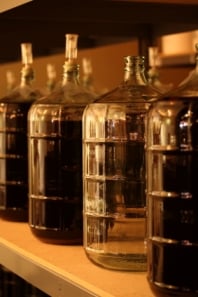 This week we take a look at how beers can develop moldy and musty off-flavors. This can happen in home brewed beers and even some commercial beers depending on how they are brewed and stored.
This week we take a look at how beers can develop moldy and musty off-flavors. This can happen in home brewed beers and even some commercial beers depending on how they are brewed and stored.
Musty and moldy flavors can manifest themselves in several ways in beer. The off-flavor can very from mold to rotten wood, leaves, old books, attic, wet dog, wet towel to simple mold and must. Its not an attractive flavor or aroma in most beers.
The Cause of Moldy, Musty Beer
Not surprisingly mold and mildew is the primary cause of musty beer. Mold can develop at various stages in brewing from raw ingredients to the finished bottled beer or even the tap lines and taps used to serve finished beer. In a finished or fermenting beer you can often see the mold as a ring or layer on top of the beer.
To diagnose your moldy beer a good place to start is your ingredients. Not surprisingly, moldy malt or hops will infuse a moldy taste in the finished beer. The main cause of moldy ingredients is storing malt, hops or adjuncts in a high humidity environment, though heat can also contribute to mold and mildew. To avoid mold, store your ingredients in a cool, dry location ideally in sealed containers.
The next place to look for mold contamination is during fermentation. One of the common causes here is a fermentation refrigerator or cooler that has not properly been cleaned. Refrigerators and freezers are often contaminated with mold which can work its way into your fermenter.
It is also possible to get mold in your fermenter, especially when working with beers that have extended fermentations. Diligent sanitation is needed throughout the brewing process, and you need to manage small thinks like the small amount of water in your air lock if you are storing beer in a secondary for an extended period. If you are not careful transferring or bottling beer you can also contaminate your beer.
Finally it is very common to get mold and mildew in your keg lines and taps, especially if you don’t clean them regularly. Unrefrigerated lines and taps are particularly susceptible as they have a combination of darkness, moisture and warm air that is a breeding ground for mold. Clean your lines and taps regularly to avoid contamination.
Those are some tips on avoiding mold and mildew in your beer. Thanks for joining me on the BeerSmith Home Brewing Blog. Be sure to sign up for my newsletter or my podcast (also on itunes…and youtube…and streaming radio station) for more great tips on homebrewing. Also check out the How to Brew Video series I shot with John Palmer if you want to learn more about all grain brewing.